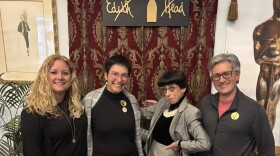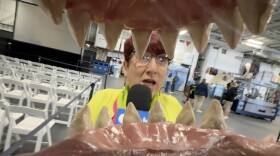Alika Williams just had the experience so many San Diego kids dream of — stepping up for his first major league at bat in Petco Park. Last week, the 24-year-old San Diego native made his major league debut and heard his name called for the very first time.
“Number 75, Alika Williams.”
It’s a moment the Pittsburgh Pirates infielder will never forget.
“It was awesome to be able to do it in my hometown and have so many family and friends come out in support,” Williams said.
Debuts do not happen every day in baseball. So when they do, it’s a moment Major League Baseball wants to officially mark. Hours before Williams' big moment, MLB authenticator JC Smith was preparing.
“If he gets in the game, he’s going to want to get a lot of things authenticated,” Smith said.
Smith is part of a team of six at Petco Park who authenticates items from each game. That means they watch every pitch, every swing, every hit, every out very carefully. If anything significant happens, from a major milestone to a no-hitter to a first-ever at bat, they track the ball and any other equipment involved.
“We watch baseball differently than the average fan because we’re following the ball,” Smith said. “We keep track of everyone who touches the ball, where the ball goes and how it comes out of play.”

Smith and the other authenticators are current or former police. They work as MLB authenticators as a side job — so they are not providing security at the games as other San Diego Police officers do. Their role is to do “evidence control” on up to 40 game balls a night, plus broken bats, base pads, lineup cards, field dirt, or, in the case of Williams, his debut game jersey.
After something like a ball comes off the field, it gets passed to the authenticators and they label it with a hologram sticker that identifies the item as legit. They also detail how it was used during the game.
Steve Villalobos was a San Diego Police officer for 32 years and has been an MLB authenticator with the Padres since 2006.
“It’s a witness-based program that we do,” he said. “So we have to see something to be able to authenticate it.”
His day starts with helping oversee the certification of all the game balls that will be used in the game. Then he heads out on the field to authenticate the Padres team lineup card.
“My hologram is now on it, so it’s an official lineup card ready for game-use,” he said after verifying a card at last Tuesday’s game.
Some things Smith and Villalobos are authenticating will end up going back to players, the teams, or even the Baseball Hall of Fame. Some of it will also be sold to fans. The Padres have a game-used store at Petco Park where people can buy things like balls, jerseys, or hats. MLB authenticators also specialize in verifying that autographs are real — they watch players during signing sessions. If something has the shiny silver hologram sticker, it’s because an authenticator was there to witness it.
“Authentication is everything,” said Sean Daily, who bought a replica lineup card for his son Max with an autograph from one of their favorite players, CJ Abrams. “I would never buy a signature online without that sort of authentication — ever.”
Daily has peace of mind knowing the signature is real and he can go online and read about the item’s back story.
“I didn't realize you can just scan the QR code here, it takes you to a site and it tells you the context,” Daily said. “It was this inning, it was this bat, this is what happened at the moment. So, it’s a great way to log that moment in history.”

The MLB authentication program covers every team in the league, but it actually started in San Diego. In the late 1990s and early 2000s, Padres legend Tony Gwynn noticed his signature was being forged. Gwynn helped launch an investigation that revealed a massive forgery scandal uncovered by the FBI, said Michael Posner, who leads MLB’s Authentication Program.
“That was kind of the touchstone moment where everyone realized there’s a problem here,” Posner said.
The program was necessary because people were faking autographs and claiming items came from games when they simply did not, Posner said.
“If there’s no way to put a stamp on it and say, ‘this is it this is how we witnessed it, here’s the process,’ people have the opportunity to forge it because there’s a vacuum in the space,” he said. “And generally when there’s a vacuum in the space, bad actors come in. And we have been very, very proactive to keep those people out of the business so the idea now is not just autographs, it’s to be able to do it with game-used products because they’re sought after.”
MLB only hires current or former law enforcement to be authenticators because of their training on how to handle evidence. Villalobos, the authenticator and 32-year police veteran, said there is some crossover.
“We have to see it, it has to get to us, we have to document it,” he said. “So it would be the same thing at an evidentiary scene … People will call us and say, ‘hey I have this jersey that was signed by someone, can you authenticate it?’ No, I didn't watch the person sign it.”
After the game, San Diego native Alika Williams had his debut jersey authenticated and Smith was there to mark the moment. Smith spent 26 years with the San Diego Police Department, then worked for the district attorney's office.
“I had to watch the jersey actually come off Williams when he came off the field because they can’t just give us any jersey and say, ‘hey this was the one he was wearing,’ I have to see it,” Smith said. “It’s almost like in court for law enforcement that we have to testify we saw the evidence and where it came from.”
Both Smith and Villalobos have spent nearly 20 years authenticating baseball memorabilia. They estimate they have checked around 25,000 items. Some are more unique than others, like verifying champagne bottles used in playoff celebrations. Home runs are generally not tracked, because authenticators do not have eyes on the ball at all times. However, when a team is expecting a major home run milestone, MLB can put a covert mark on balls to later identify them.
And for Smith and Villalobos, it’s the milestone moments that stand out. Like Barry Bonds tying the home run record or Trevor Hoffman getting his 500th save.
“I think what keeps me going, I don't want to miss anything,” Villalobos said. "Cool stuff happens at the ballpark and if you’re a fan, you want to be there to see it. It’s unbelievable to be a part of it. You’re actually a part of history when you authenticate items that were used in a special game.”
The hologram stickers placed on authenticated items have a unique serial number and they are made to be tamper-proof. Since 2001, MLB says more than 6 million items have been authenticated.





